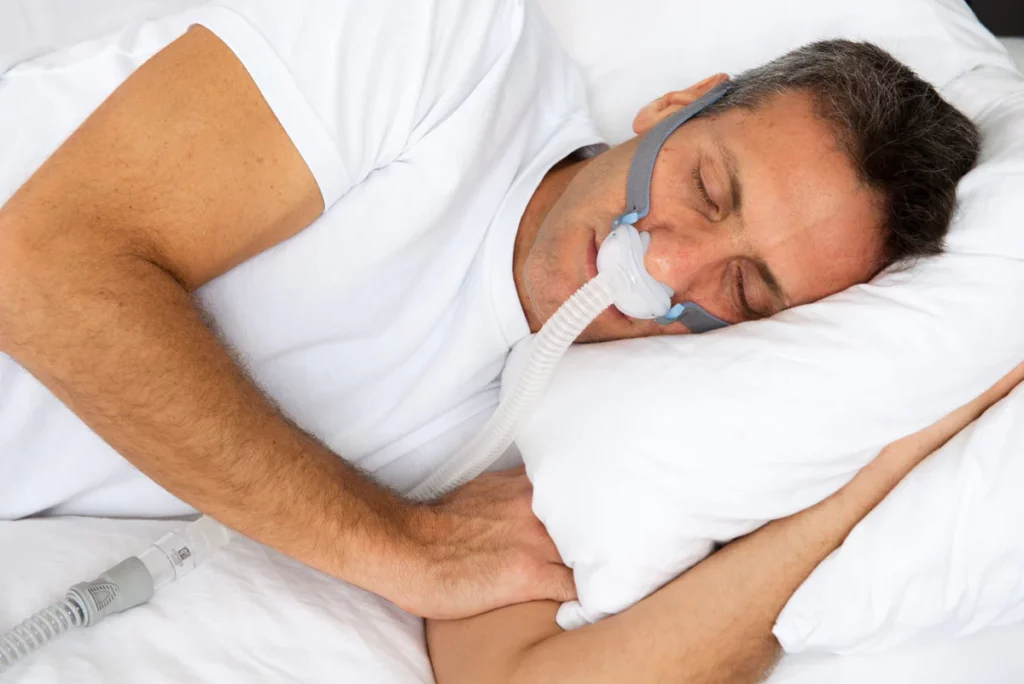Introduction: A Silent Disruption in the Night
Sleep is meant to refresh our bodies and minds, but for millions of people, nighttime brings an unseen struggle — sleep apnea. This sleep disorder causes repeated pauses in breathing or shallow breaths during the night, robbing the body of oxygen and preventing restorative rest.
While sleep apnea has many potential causes, excess weight is one of the most significant risk factors, especially for the most common form, obstructive sleep apnea (OSA). This raises an important question: Can weight loss actually cure sleep apnea?
Researchers have explored this for years, and the answer is promising but nuanced. Before we dive into the science, let’s understand the roots of sleep apnea.
Causes of Sleep Apnea: Understanding the Triggers
Obstructive Sleep Apnea (OSA)
OSA occurs when the muscles in the throat relax too much during sleep, allowing soft tissues to block the airway.
See more: How to Choose the Right CPAP Mask for Your Machine and Sleep Style
Risk factors for OSA include:
- Excess body weight: Fat deposits around the neck and upper airway can narrow breathing passages.
- Anatomical features: Large tonsils, adenoids, or a naturally narrow throat.
- Age: Muscle tone decreases with age.
- Sleeping position: Back sleeping increases airway collapse risk.
- Alcohol or sedatives: These relax throat muscles further.
Central Sleep Apnea (CSA)
CSA is less common and involves the brain failing to send proper signals to the breathing muscles. It’s often linked to heart problems, neurological issues, or certain medications, rather than weight.
Symptoms of Sleep Apnea: Signs You Shouldn’t Ignore
The most obvious sign of sleep apnea is loud, chronic snoring, but the symptoms can go far beyond that. Many people have sleep apnea without realizing it, especially if they live alone.
Common symptoms include:
- Loud snoring (more often in OSA)
- Pauses in breathing during sleep (noticed by a partner)
- Gasping or choking in the night
- Morning headaches
- Daytime fatigue, no matter how long you sleep
- Trouble concentrating or memory lapses
- Mood changes like irritability or anxiety
Subtle signs:
Some people don’t snore at all but still experience oxygen drops at night. This can manifest as unexplained morning grogginess, waking up with a dry mouth, or feeling “hungover” without drinking.
Example: Sarah, a 39-year-old teacher, always thought her tiredness was due to stress. But after her partner mentioned her irregular breathing patterns at night, she had a sleep study — and was diagnosed with moderate OSA.
The Link Between Weight and Sleep Apnea
Excess weight is one of the strongest predictors for developing OSA. Fat deposits in the neck and tongue can narrow the airway, making it more likely to collapse during sleep. Abdominal fat can also reduce lung volume, which increases breathing effort.
Studies show that obese individuals are up to four times more likely to develop sleep apnea than those at a healthy weight. The good news? Losing weight can significantly reduce — and sometimes eliminate — symptoms.
Can Weight Loss Cure Sleep Apnea?
The short answer: It can for some people, but not all.
What the research says:
- A 2009 study in the American Journal of Respiratory and Critical Care Medicine found that losing just 10–15% of body weight reduced the severity of OSA by up to 50% in moderately obese patients.
- Some participants experienced complete remission, but others still had mild to moderate symptoms even after significant weight loss.
- People with severe OSA may still require medical treatment, even at a healthy weight, because anatomical factors or genetics can play a role.
Why weight loss helps:
- Reduces fat tissue around the upper airway
- Improves lung capacity and oxygen exchange
- Decreases inflammation that can contribute to airway narrowing
Example: Tom, 52, lost 40 pounds through diet and exercise after being diagnosed with OSA. His follow-up sleep study showed a dramatic improvement, and he no longer needed nightly CPAP therapy. However, his doctor recommended periodic checkups to ensure symptoms didn’t return.

Treatment Options Beyond Weight Loss
While weight loss can be a game changer for many, it’s not a one-size-fits-all cure. Let’s explore other treatment options available for managing sleep apnea.
1. CPAP Therapy (Continuous Positive Airway Pressure)
A CPAP machine delivers constant air pressure through a mask, keeping the airway open during sleep. It’s considered the gold standard for OSA and works regardless of weight.
2. Oral Appliances
Custom dental devices reposition the jaw or tongue to prevent airway collapse. These are useful for mild to moderate OSA.
3. Surgery
Procedures may remove excess tissue from the throat, reposition the jaw, or correct structural problems in the airway.
4. Lifestyle Changes
- Positional therapy: Sleeping on your side can prevent airway blockage.
- Avoiding alcohol and sedatives: These worsen muscle relaxation in the throat.
- Improving nasal breathing: Treating allergies or using nasal dilators can help.
5. For Central Sleep Apnea
CSA often requires different approaches, such as adaptive servo-ventilation devices, oxygen therapy, or treating underlying conditions like heart disease.
Natural Lifestyle Changes That Support Weight Loss and Better Breathing
Even if weight isn’t the only factor in your sleep apnea, healthy habits can improve symptoms and overall health.
- Balanced diet: Focus on whole foods, lean proteins, vegetables, and complex carbs.
- Regular exercise: Aim for both cardiovascular and strength training.
- Consistent sleep schedule: Quality sleep supports hormone balance and weight control.
- Mindful eating: Avoid heavy meals close to bedtime.
- Hydration: Adequate water intake helps maintain healthy airway tissue.
The Bottom Line: Cure vs. Control
Weight loss can be a powerful tool in fighting sleep apnea, but it’s not always a cure. Some people will see their symptoms disappear completely, while others may only experience partial improvement.
That’s why it’s crucial to work with a healthcare provider. A follow-up sleep study after weight loss can confirm whether treatment is still needed.
Conclusion: Take Action for Restful Nights
Sleep apnea is more than just snoring — it’s a serious condition that can affect your heart, brain, and overall quality of life. Excess weight is one of its biggest drivers, and research clearly shows that weight loss can reduce or even eliminate symptoms for many people.
However, it’s not the only piece of the puzzle. Some individuals will need CPAP therapy, oral appliances, surgery, or other interventions even after reaching a healthy weight.
If you suspect you have sleep apnea — especially if you snore loudly, feel exhausted during the day, or have pauses in breathing at night — don’t wait. Seek medical advice, get tested, and explore a treatment plan tailored to you. The right approach could mean the difference between struggling for air and finally sleeping in peace.

